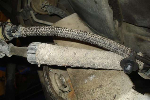- Joined
- January 3, 2008
- Messages
- 6,000
- Reaction score
- 56
- Location
- Sioux Narrows Canada
- City, State
- Elite Canuck,multiple ifs offender,, and musky maniac,, i wheel and i fish,,
- Year, Model & Trim Level
- 99 xls,96 xl,91,08 Ranger
well, okay, let me chime in here,,
pay the money get the good ones,,
you may have seen my rig, if not click on the bottom, 35's and coilovers,,
i ran the expensive hubs and only ever changed one in the whole time i had my 96 xl,,
it had the Timkens in it when i bought it, and i put on well over 200,000 kilometers on one set, i did change one out, but ,, i thought it had a noise, but when i changed it the noise didn't go away, so it is still good, in fact , i keep it as a spare,
my 99 is new to me not that long ago , but i checked , it has Timkens too, and will stay that way,, even though they are even more expensive here in Canada than in the lower 48,, , get the good one,,
pay the money get the good ones,,
you may have seen my rig, if not click on the bottom, 35's and coilovers,,
i ran the expensive hubs and only ever changed one in the whole time i had my 96 xl,,
it had the Timkens in it when i bought it, and i put on well over 200,000 kilometers on one set, i did change one out, but ,, i thought it had a noise, but when i changed it the noise didn't go away, so it is still good, in fact , i keep it as a spare,
my 99 is new to me not that long ago , but i checked , it has Timkens too, and will stay that way,, even though they are even more expensive here in Canada than in the lower 48,, , get the good one,,












